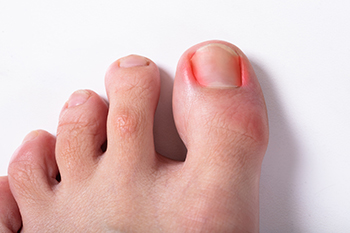
Ingrown toenails, or onychocryptosis, is a nail disorder that children and adults can get where the toenail grows into the skin surrounding the nail. Since the toenail pierces the skin, it can be a site for inflammation and infection. This can be painful and impact a child’s activities. Ingrown toenails often affect teenagers. They may get this from wearing shoes that are too tight and compress the nails, from cutting their toenails improperly, or from getting a fungal nail infection. Properly fitted shoes should have room in the toe box for the toes to move easily. Toenails should be cut straight across, not too short, and the edges should be smoothed with a nail file. Fungal nail infections can cause thickening of the toenails, which are more apt to break off in small spikes near the outer edge of the toenail causing an ingrown toenail. Teens who play a lot of sports often have sweaty feet and this can make the toenails tender and easier to penetrate surrounding skin. If your child has an ingrown toenail, it is suggested that you make an appointment with a podiatrist to have the nail examined and proper treatment administered.
Ingrown toenails may initially present themselves as a minor discomfort, but they may progress into an infection in the skin without proper treatment. For more information about ingrown toenails, contact one of our podiatrists of Riznyk Podiatry. Our doctors can provide the care you need to keep you pain-free and on your feet.
Ingrown Toenails
Ingrown toenails are caused when the corner or side of a toenail grows into the soft flesh surrounding it. They often result in redness, swelling, pain, and in some cases, infection. This condition typically affects the big toe and may recur if it is not treated properly.
Causes
You are more likely to develop an ingrown toenail if you are obese, have diabetes, arthritis, or have any fungal infection in your nails. Additionally, people who have foot or toe deformities are at a higher risk of developing an ingrown toenail.
Symptoms
Some symptoms of ingrown toenails are redness, swelling, and pain. In rare cases, there may be a yellowish drainage coming from the nail.
Treatment
Ignoring an ingrown toenail can have serious complications. Infections of the nail border can progress to a deeper soft-tissue infection, which can then turn into a bone infection. You should always speak with your podiatrist if you suspect you have an ingrown toenail, especially if you have diabetes or poor circulation.
If you have any questions, please feel free to contact our office located in Orchard Park, NY . We offer the newest diagnostic and treatment technologies for all your foot care needs.